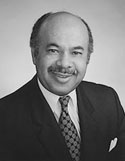9-11 and the Race Industry

by Ward Connerly
April/May 2002
One could hardly read a newpaper or a periodical or tune in to a news program on radio or television prior to September 11, 2001 and not be exposed to discussions about the “Three Rs” of race in America: racial profiling, race preferences and reparations for the descendants of slaves. The events of “9-11” and its aftermath have changed all that, at least temporarily.
For the past eleven weeks, America has been doing its best to cope with an outbreak of anthrax, avoid an economic recession, hotly pursue those whom our president rightly describes as “does of evil,” and , of equal importance, prevent national panic from overwhelming us a we confront these challenges.
Most of us know that our nation has been forever changed by the past few weeks. We are certainly much more conscious of the threats we face from terrorists, now knowing that we can no longer be as casual about attending a major sports event, driving over a bridge, going to a movie, or even a task as simple as opening a letter — things that we took for granted prior to September 11 — now require a degree of cautious behavior on our part.
In addition to all of these widely discussed changes about America, there is something else that has changed about the nation and its people, not yet enduring but profound nonetheless: The American people want to celebrate their unity more than their “diversity.” Americans yearn to be part of a national community. For this reason, throughout the land there is an unspoken consensus to suspend our hyphenated identities and “multiculturalism” in deference to the need for unity as we pursue a common enemy intent on destroying us all.
Since “9-11,” I have traveled to several states, and from this experience I am convinced that, considering the host of daunting problems we now face, Americans from all walks of life realize how inconsequential their “race” is. This reality was beginning to dawn on many Americans long before the terrorists’ attacks on the World Trade Towers and the Pentagon – two foremost symbols of our economic prowess and our system of democracy. The irrelevance of “race” has been underscored, however, by the realization taht some madman is hiding somewhere in a cave thousands of miles away, or is walking among us and is prepared to give his life so that we can be deprived of ours. We somehow sense that we will be unable to defeat our common enemy if we are divided by something as silly as the skin color of our neighbor or the person workng at the desk across the hall.
Not all Americans want this state of unity and raical bliss to be a permanent part of the national landscape. Meeting last week in Atlanta at the “State of the Black World Conference,” several presumptive captains of the race industry returned to their old tired, race-baiting rhetoric. For example, Jesse Jackson said, “We are in danger…The extreme right-wing has seized the government. Tonight, Ashcroft and the CIA and the FBI and Homeland Security and the IRS can work together, so look out. Because without a definition of who is a terrorist, anyone can be…Martin Luther King could have been…Malcolm X, the Black Panthers.” He continued: “The right-wing media, the FBI, they are targeting our leadership.”
Al Sharpton, the man who wants to replace George W. Bush as president, said, “We don’t owe America anything, America owes us,” to the thundering applause of those assembled. Atlanta Mayor Bill Campbell who welcomed the audience thusly established the anti-America theme for the rest of this conference: “While the rest of the country waves the flag of Americana, we understand we are not part of that.” Ironically, these are all individuals who cut their political eyeteeth on the glorious and uplifting message uttered by John F. Kennedy: “Ask not what your country can do for you; ask what you can do for your country.”
In the past, the traditional civil rights leadership has largely defined the issues of race that America must confront, and they have provided the essential leadership to guide our nation to a better place for all Americans. The clear and unmistakable truth – one that has been evolving for at least a decade is that we can do no longer rely on that establishment to provide the moral leadership and vision that is critical to building a better America for all. They have lost their focus.
Before this decade is over, race-based affirmative action preferences will, for the most part, be thrown into the ash heap of history. Either the courts or public opinion will make that statement a virtual certainty. But, our nation’s racial nightmare will not end with the death of race preferences. We must also end the insidious practice of racial classifications by the government, and banish race from the legitimate sphere of government. In effect, we must “deregulate” the race industry.
An enlightened America where individuals consider themselves “one nation” and respect neither “race” nor ethnicity when it comes to choosing a life partner and having children will not tolerate a system in which the government divides its citizens on the basis of melanin content. But, don’t expect the captains of the race industry to lead us to that state of enlightenment.
Ward Connerly, author of the autobiography, Creating Equal: My Fight Against Race Preferences, is founder and chairman of the American Civil Rights Institute — a national, not-for-profit organization aimed at educating the public about the problems created by racial and gender preferences. Connerly has gained national attention and respect as an outspoken advocate of equal opportunity for all Americans, regardless of race, sex, or ethnic background.
by Ward Connerly
Copyright (c) 2002 ACRI and The Multiracial Activist. All rights reserved.

